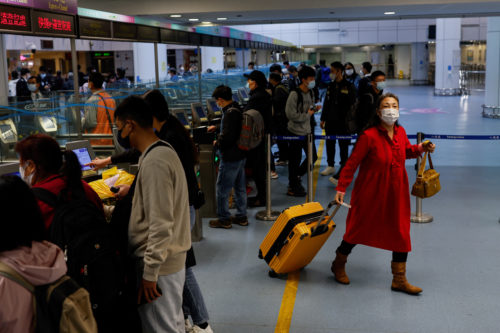China opens up its borders
In the latest move made by Beijing to dismantle its COVID-zero policy, inbound travelers no longer need to quarantine, while some foreign visas and domestic passport processes have been resumed. But some still fear the wave of infections sweeping over China.

China will scrap quarantine for inbound travelers starting on January 8, the country’s National Health Commission (NHC) announced (in Chinese) yesterday, as Beijing continues to dismantle the last remaining COVID-zero restrictions that has kept the country largely in isolation since the start of the pandemic.
The lift in quarantine rules was part of a broader move by the NHC that downgraded the classification of COVID from top-level Class A, which covers diseases such as the bubonic plague and cholera, to Class B, which covers diseases like SARS and AIDS.
- Starting on January 8, inbound travelers will no longer need to quarantine or apply for pre-arrival clearance, but would still need to obtain a negative PCR test within 48 hours of departure and to wear masks on flights. The current quarantine policy of five days at a centralized facility followed by three days at home will also end on that date.
- Authorities will stop tracking close contacts of COVID patients, halt the designation of high- or low-risk areas, and cancel quarantine measures for entry personnel and imported goods.
- However, in light of the downgrade, authorities will strengthen epidemic prevention and control protocols at key institutions such as elderly care institutions, bolster vaccination efforts for high-risk individuals, and shore up the supplies of critical drugs and medical facilities.
Chinese citizens will also be able to resume travel overseas: Processing passport applications for Chinese nationals seeking to travel abroad will be “resumed in an orderly manner,” China’s National Immigration Administration (NIA) announced (in Chinese) today, in accordance with the lower classification of the virus.
- The extension or renewal of foreigners’ visas will also be restored, the NIA added, as well as visas for mainland residents traveling to Hong Kong for tourism and business.
- China will also resume a policy that allows visa-free transit of up to 144 hours for travelers.
The announcement is the latest removal of a host of other COVID-zero measures, after the NHC declared on Sunday (in Chinese) that it will no longer publish its daily reports on COVID data after nearly three years, amid criticisms that the reports no longer accurately reflect the spread of the virus.
- Relevant COVID information will instead be published by the Chinese Center for Disease Control and Prevention, the announcement said, without citing further information.
- China will eventually publish data on COVID-19 cases once a month when the disease comes under Class B management, an official at the Chinese Center for Disease Control and Prevention said on Tuesday per Reuters.
Meanwhile, the wave of COVID cases is expected to hit upward of hundreds of millions following the rapid lift in restrictions. Many Chinese cities are expecting to see infections peak in January, while hospitals and crematoriums are under strain to keep up with the surge in demand.
- Traffic in Beijing has shot up by about 90% from a week ago to “heavily congested” levels, according to Baidu data per CNBC, though congestion remained low in other major cities, like Shanghai and Shenzhen.
- Some people are rushing to purchase plane tickets out of the country upon news of the changes, with bookings increasing as much as 850% from the day before, according to data from Ctrip, Trip.com, and Quanar. Hong Kong residents have also flooded the internet with searches for flights to key mainland cities.
- However, others are responding with mixed emotions. While some are celebrating the newfound freedoms, others remain concerned for their own health or the safety of those most vulnerable to getting sick.






